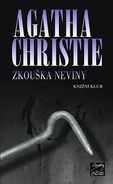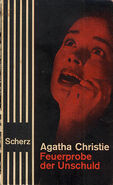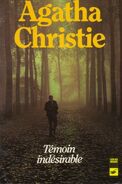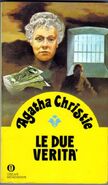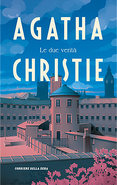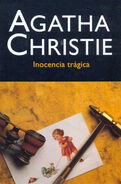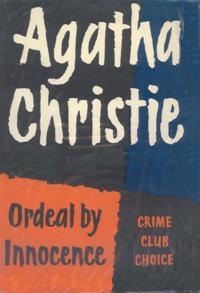
Dust-jacket illustration of the first UK edition
Ordeal by Innocence is a work of detective fiction by Agatha Christie and first published in the UK by the Collins Crime Club on November 3 1958 and in the US by Dodd, Mead and Company the following year. The UK edition retailed at twelve shillings and sixpence (12/6) and the US edition at $2.95. It is regarded by critics as one of the best of her later works, and was also one of Christie's two favorites of her own novels, the other being Crooked House.
The novel is also noted for being one of Christie's darkest works, alongside such classics as Ten Little Niggers, with a strong focus on the psychology of innocence.
Plot summary
While serving a sentence for killing his foster mother – a crime he insisted he didn't commit – Jacko Argyle dies in prison. Two years later, the man who could have supported Jacko's alibi suddenly turns up; and the family must come to terms with the fact not only that one of them is the real murderer, but also that suspicion falls upon each of them. Christie's focus in this novel is upon the psychology of innocence, as the family members struggle with their suspicions of one another.
The witness, Arthur Calgary, believes that, when he clears the name of their son, the family will be grateful. He fails to realise the implications of his information. However, once he does so, he is determined to help and to protect the innocent by finding the murderer. To be able to do so, he visits the retired local doctor, Dr. MacMaster, to ask him about the now-cleared murderer, Jacko Argyle. Dr. MacMaster states that he was surprised when Jacko killed his mother. Not because he thought that murder was outside Jacko's 'moral range', but because he thought Jacko would be too cowardly to kill somebody himself; that, if he wanted to murder somebody, he would egg on an accomplice to do his dirty work. Dr. MacMaster says "the kind of murder I'd have expected Jacko to do, if he did one, was the type where a couple of boys go out on a raid; then, when the police come after them, the Jackos say 'Biff him on the head, Bud. Let him have it. Shoot him down.' They're willing for murder, ready to incite to murder, but they've not got the nerve to do murder themselves with their own hands". This description seems to be a reference to the Craig and Bentley case, which had occurred in 1952.
Characters
Dr Arthur Calgary, scientist
Inspector Huish, investigating officer
Rachel Argyle, adoptive mother of five children
Leo Argyle, her husband
Jacko Argyle, their problematic adopted son
Hester Argyle, their Irish adopted daughter
Tina Argyle, their mixed race adopted daughter
Micky Argyle, their adopted son
Mary Durrant, their American adopted daughter
Filip Durrant, Mary's palsied husband
Gwenda Vaughan, Leo's secretary
Kirsten Lindstrom, Swedish carer and masseuse
Maureen Clegg, Jacko's wife
Joe Clegg, Maureen's new husband
Dr Donald Craig, Hester's boyfriend
Dr MacMaster, doctor
Literary significance and reception
Philip John Stead concluded his review in the Times Literary Supplement of December 12, 1958, with, "The solution of Ordeal By Innocence is certainly not below the level of Mrs. Christie's customary ingenuity, but the book lacks other qualities which her readers have come to expect. What has become of the blitheness, the invigorating good spirits with which the game of detection is played in so many of her stories? Ordeal By Innocence slips out of that cheerful arena into something much too like an attempt at psychological fiction. It is too much of a conversation piece and too many people are talking – people in whom it is hard to take the necessary amount of interest because there is not enough space to establish them. The kind of workmanship which has been lavished on this tale is not a kind in which the author excels and the reader feels that Miss Marple and Poirot would thoroughly disapprove of the whole business."
Sarah Russell of The Guardian gave a short review to the novel in the December 9, 1958 issue when she said, "In this solving of a two-year-old family murder sympathy is, unusually with Miss Christie, evoked for too many people to leave enough suspects; but the unravelling is sound and the story well told."
Maurice Richardson of The Observer of November 2, 1958 said, "The veteran Norn has nodded over this one. There is ingenuity, of course, but it lacks a central focus. The characters are stodgy and there is little of that so readable, almost crunchable dialogue, like burnt sugar." He concluded, "The serious socio-psychological approach doesn't suit A.C. somehow. Only at the end with the big surprise do you feel home and dry."
Robert Barnard: "One of the best of 'fifties Christies, and one of her own favourites (though she named different titles at different times). The Five Little Pigs pattern of murder-in-the-past, the convicted murderer having died in prison, innocent. Short on detection, but fairly dense in social observation. Understanding in treatment of adopted children, but not altogether tactful on the color question: 'Tina's always the dark horse…Perhaps it's the half of her that isn't white.'"
Film, TV or theatrical adaptations
Ordeal by Innocence (1985 film)
A close film adaptation was made in 1985, starring Donald Sutherland, Christopher Plummer and Sarah Miles. Its musical score (by Dave Brubeck) has in many quarters been heavily criticised as totally inappropriate for this style of mystery and has given the film a certain notoriety.
Agatha Christie's Marple
The novel was adapted for the third season of the ITV television series Marple featuring Geraldine McEwan first broadcast in 2007. This version changed heavily from the novel. Gwenda Vaughan is the second victim in this adaptation, not Philip (however, she dies in the same way - stabbed at the bottom of the brain). Kirsten also remorsefully stabs Tina in the novel in an attempt to silence her and Michael is omitted completely. There is also the addition of another adopted child Bobby, who is the twin brother of Jacko (he commits suicide after financial ruin). Kirsten is arrested in the end, unlike the novel, where she escapes. However, it is suggested that Kirsten will be picked up by the police later.
2007 stage adaptation
The novel was also adapted into a stage play by Mary Jane Hansen and performed for the first time by the New York State Theatre Institute in Troy, New York. The original run lasted from February 4 to February 17, 2007, and included 14 performances.
Graphic novel adaptation
Ordeal by Innocence was released by HarperCollins as a graphic novel adaptation on July 1, 2008, adapted and illustrated by "Chandre" (ISBN 0-00-727531-5). This was translated from the edition first published in France by Emmanuel Proust éditions in 2006 under the title of Témoin indésirable.
Publication history
- 1958, Collins Crime Club (London), November 3, 1958, Hardcover, 256 pp
- 1959, Dodd Mead and Company (New York), 1959, Hardcover, 247 pp
- 1960, Pocket Books (New York), Paperback, 211 pp
- 1961, Fontana Books (Imprint of HarperCollins), Paperback, 192 pp
- 1964, Ulverscroft Large-print Edition, Hardcover, 256 pp
In the UK the novel was first serialised in the weekly magazine John Bull in two abridged instalments from September 20 (Volume 104, Number 2725) to September 27, 1958 (Volume 104, Number 2726) with illustrations by “Fancett”.
In the US, the first publication was in the Chicago Tribune in thirty-six parts from Sunday, February 1 to Saturday, March 14, 1959 under the title of The Innocent.
An abridged version of the novel was also published in the February 21, 1959 issue of the Star Weekly Complete Novel, a Toronto newspaper supplement, with a cover illustration by Russell Maebus.
International titles
- Czech: Zkouška neviny (Ordeal by Innocence)
- German: Tödlicher Irrtum (Fatal Error)
- German: Feuerprobe der Unschuld (Trial By Fire for Innocence)
- Spanish: Inocencia trágica (Tragic Innocence)
- Swedish: Prövad Oskuld (Proven Innocent)
- Turkish: İçimizden Biri (One of us)
- Italian: Le due verità (The Two Truths)
- French: Témoin indésirable (Unwanted Witness)
Note: The change from first German title to second German title occurred as a tie-in to the movie adaptation, which was released in German movie theatres als Feuerprobe der Unschuld.


